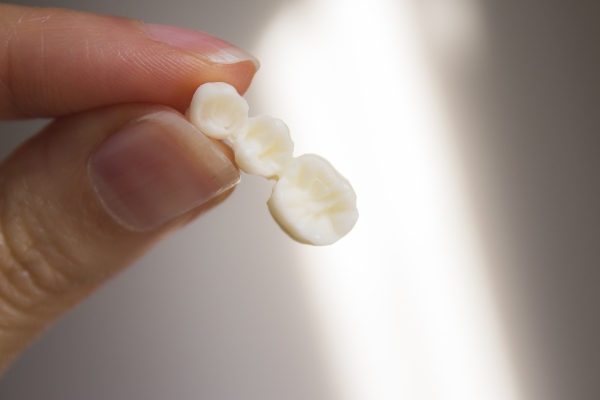Prevention is Key in the Fight Against Periodontal Disease

Periodontal disease is brought on by plaque accumulation. Plaque is the sticky film of bacteria mixed with sugary or starchy debris from foods. The body’s immune system reacts by releasing substances to kill this infection. During this time, the body might harm the gums, alveolar bone or periodontal ligament. The American Dental Association reports gum disease affects nearly 50% of Americans. However, early treatment can easily stop it.
About periodontal disease
Gingivitis is the first stage of gum disease. It makes the gum swell and bleed. If untreated, gingivitis will worsen, and the tooth will loosen in its socket. At this point, the disease becomes periodontitis, the advanced stage of gum disease.
Once periodontal disease reaches its advanced stage, the consequences cannot be reversed. A surgical procedure may be necessary to restore health to the oral cavity. The key to fight against this disease lies in preventing it from ever happening. Prevention is possible by adopting excellent oral hygiene practices and seeing the dentist often. Experts recommend visiting the dentist every six months. If you have suffered gum disease before, you may need to visit the dental expert more often.
Risks and prevention of periodontal disease
Bacteria plaque is indeed the primary cause of periodontal disease. However, several other factors may make you more susceptible. These include diseases, medicines and oral habits. These factors can also worsen the disease once infection forms.
Genetics
Some patients are more prone to get periodontal disease because of their genetic makeup. However, your genes do not make the condition unavoidable. If you are highly prone to gum disease, you should take your oral care seriously. The dentist can help you form a custom care plan.
Smoking and tobacco use
Smoking heightens the chances of getting periodontal disease. It could also worsen the condition and make your body resistant to treatment. Quitting smoking and tobacco use can help prevent the disease.
Crowded teeth, braces or dental bridges
The unifying factor of all these is the difficulty of flossing and brushing the teeth. Without proper flossing, bacteria can build up. You can learn the correct way to clean your teeth from the dentist if you have braces or bridge work. If your teeth are misaligned or crowded, orthodontic treatment to straighten the teeth may help prevent the problem.
Teeth grinding or clenching
While the habit itself will not cause periodontal disease, it could worsen the condition if you already have inflamed gums. Clenching places undue pressure on the teeth and could accelerate the degradation of the bone and periodontal ligament. Try to quit this clenching by learning stress management techniques. You can contact your dentist to get a custom mouth guard to prevent grinding at night.
Medicine
Certain drugs can lead to dry mouth. Examples include those for treating depression and blood pressure. Without enough saliva in the mouth, plaque is likely to form. Some medications may enlarge the gums. If you notice any of these symptoms, contact the doctor for advice.
Nutrition
Poor nutrition may affect your body’s immunity or ability to fight germs and diseases. For instance, vitamin C deficiency can lead to bleeding gums. Certain foods can help strengthen your gums and reverse gum disease.
Keep your gums healthy
Preventing periodontal disease is simple. You only need to brush, floss and avoid bad habits. Some factors like medicine and genetics may be unavoidable, but they can be managed. Call our office to schedule an appointment to check your gums and teeth.
Request an appointment here: https://www.mysaratogadentist.com or call My Saratoga Dentist PLLC at (518) 675-3094 for an appointment in our Saratoga Springs office.
Check out what others are saying about our services on Yelp: Read our Yelp reviews.
Recent Posts
A dental bridge is a popular tooth replacement option for those missing one or several teeth. Missing teeth can cause problems that go beyond the aesthetic. Therefore, patients should replace teeth promptly to preserve the health and appearance of their smile. Fortunately, a dental bridge is an effective and natural-looking way to do that.A dental…
Dental bridge placement will need two visits. The patient will go through a short process that will not be invasive at all. The result will improve the patient’s dental and general health. Knowing the placement process for this restoration can help prepare you for your next visit. Here is the placement process for a dental…
Single-tooth replacement is important for oral health and the appearance of the smile. The dental bridge is one of the most popular options for individual tooth replacement. Here is a closer look at why single-tooth replacement is crucial and the advantages of a dental bridge.Having just one missing tooth visible when smiling can make someone…
A dental bridge is a tooth replacement option designed to fill in the gaps in your smile caused by missing teeth. Dental bridges restore the basic functions of biting and speech as well as the visual appeal of your smile. This guide explains the dental bridge procedure and how it works to replace lost teeth.Dental…


